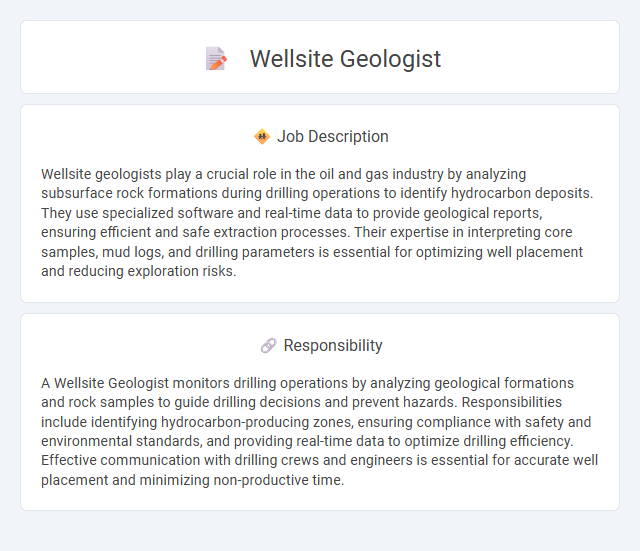
Wellsite geologists play a crucial role in the oil and gas industry by analyzing subsurface rock formations during drilling operations to identify hydrocarbon deposits. They use specialized software and real-time data to provide geological reports, ensuring efficient and safe extraction processes. Their expertise in interpreting core samples, mud logs, and drilling parameters is essential for optimizing well placement and reducing exploration risks.
Wellsite geologists likely need strong analytical skills and the ability to work under pressure in remote or challenging environments, suggesting that individuals who thrive in dynamic, field-based roles may be more suitable. Those with a high tolerance for physical demands and irregular hours probably find this job more compatible with their lifestyle. People who prefer routine office work or have difficulty adapting to unpredictable conditions may find the wellsite geologist role less fitting.
Qualification
A wellsite geologist typically requires a bachelor's degree in geology, earth sciences, or a related field, complemented by specialized training in petroleum geology. Proficiency in interpreting subsurface data, core analysis, and real-time drilling monitoring software is essential. Strong analytical skills and experience with geological modeling tools enhance job performance and safety compliance on drilling sites.
Responsibility
A Wellsite Geologist monitors drilling operations by analyzing geological formations and rock samples to guide drilling decisions and prevent hazards. Responsibilities include identifying hydrocarbon-producing zones, ensuring compliance with safety and environmental standards, and providing real-time data to optimize drilling efficiency. Effective communication with drilling crews and engineers is essential for accurate well placement and minimizing non-productive time.
Benefit
Wellsite geologists probably gain significant benefits from real-time decision-making opportunities that enhance drilling efficiency and safety. Their expertise likely leads to improved resource extraction accuracy, reducing operational costs and environmental impact. Career growth in geological and petroleum industries often increases due to the critical role they play onsite.
Challenge
Facing complex geological formations at wellsites likely presents significant challenges for geologists, requiring real-time problem-solving and precise data interpretation. The probability of encountering unexpected subsurface conditions demands adaptability and expert knowledge to guide drilling decisions effectively. Managing these uncertainties may impact drilling safety and efficiency, highlighting the critical role of wellsite geologists in overcoming operational difficulties.
Career Advancement
Wellsite geologists gain invaluable field experience by analyzing subsurface formations during drilling operations, positioning them for advancement to senior geologist or reservoir specialist roles. Mastery of real-time data interpretation and collaboration with drilling teams enhances their qualifications for leadership positions in exploration and production companies. Continuous skill development in petrophysics and geosteering technology accelerates career growth within the oil and gas industry.
 kuljobs.com
kuljobs.com